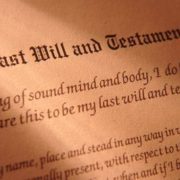Leaving a Legacy While Saving on Taxes Through Charitable Gifting
/in Estate Planning /by Dan BaronLeaving a legacy to charity is a great way to support your community, make an impact, and save on taxes. There are many charitable estate planning strategies to consider and each one comes with a careful consideration. Who you’re donating to, your financial goals, the type of asset you’re donating, tax objectives, and amount of control are just a few of the many considerations every charitable estate plan must contemplate. Using the following strategies, you can design and implement a comprehensive plan.
First, Don’t Do This…
Do not name a charity as the beneficiary of a retirement or bank account. Simply do not do this! Since big banks and financial institutions can only generate revenue based on the assets under their management, they don’t always have your best interest in mind if they lose that revenue in bequeathing your estate to your selected charity. Leaving your wealth to a stranger at a mega-corporation can cause delay and there’s no guarantee your wishes are met. Instead, it’s best to have a trusted estate “quarterback,” a.k.a. an executor and/or trustee who will ensure your plan is properly administrated. You can name your children, sibling, attorney, or trusted friend. Pick someone you trust as opposed to letting the bank pick a stranger.
Donating Through Your Will
A last will and testament is one method of donating to charities; however, it is the least efficient and most time-consuming. This option is better than naming a charity as a beneficiary of a retirement account, however, because here you at least have an executor overseeing and administering the estate. You can specify certain dollar amounts (e.g., $10,000 to XYZ church) or percentages (e.g., 10% to XYZ Church), within your will and both methods would allow your charitable beneficiaries to receive their bequest. Keep in mind that your last will does not avoid probate. Moreover, any debts against the estate would be paid first through the probate process, reducing the amount of the bequest. Nonetheless, this method is effective and acceptable.
Basic Charitable Trust Planning
Whether you already have a family trust or want to amend your current one, leaving a bequest to charity through your trust is a great way to leave a legacy. The trust will avoid probate and also provide more control. Unlike a last will, here you can spread out payments to your charity, leaving a legacy for years to come. For example, you might leave $10,000 to the OSU scholarship foundation, every year, in your family name, until the funds are depleted. Moreover, since a trust would avoid probate, the assets are also protected from creditors and the estate would remain private. Finally, you once again have a “quarterback,” known as a trustee to oversee and administer the estate.
Charitable Remainder Trust
Being able to observe the organizations you’re helping is a major benefit of an irrevocable charitable remainder trust, or “CRT.” Additionally, unlike the strategies we have discussed thus far, CRTs allow you to attain an immediate tax deduction while also creating a cash flow. The trust can be funded by real property, stock, cash, or any other type of asset. However, the tax deduction and cash flow you receive will vary depending on what type of asset you’re contributing. After funding, you receive payments over time from the revenue generated from the trust. For example, your CRT might be funded by rental properties that you not only received a tax deduction for, but now you’re receiving payments from for the rest of your life. After death, the remaining assets are given outright to the charities you’ve named.
Who’s a good fit? The CRT is a good option if you want an immediate charitable deduction but also have a need for an income stream for yourself or another person. If you set instructions to establish a CRT at your death, it is also a good option to provide for heirs, with the remainder going to charities of your choosing.
Charitable Lead Trust
A charitable lead trust, or “CLT” is the inverse of a CRT. It’s an irrevocable trust that generates a potential income stream for the named charitable beneficiary, with the remaining assets eventually going to family members or other beneficiaries. Donors choose the term of the trust and the amount distributed, at least annually, to charity. The assets used to fund a charitable trust are removed from your gross estate and may not only reduce the amount of tax your estate has to pay upon your death, but may also preserve funds for your heirs. Charitable lead trusts are not tax-exempt, and you will need to decide the tax treatment of the trust when it is created.
Who’s a good fit? This is ideal if you want to pass appreciated property to heirs and reduce gift and estate tax consequences and are also comfortable with parting with the income for a number of years in return for estate and gift tax savings.
Where Do You Start?
No matter the size of your estate, developing a charitable estate plan that will be carried out according to your wishes requires three things: (1) a Certified Public Accountant (CPA) who has experience with tax and gifting; (2) a Financial Planner; and, of course (3) an Estate Planning Attorney. The combination of utilizing these three professionals could mean the difference between a significant tax break or your estate ending up in court. For more information or to schedule a free consultation, contact Baron Law at 216-573-3723.
Dan A. Baron, Esq. Nationally Recognized as “Best Lawyer, One to Watch.”
/in Uncategorized /by Dan BaronHow to Avoid the Big Bad Wolf of Probate Court
/in Probate /by Dan BaronHow do you ensure your family and loved ones are safe from the Big Bad Wolf of probate court? Whether you have a comprehensive family trust or are just getting started with a basic estate plan, understanding and avoiding probate is paramount for each person considering the future of their loved ones. Probate is the court-administered process of settling the estate of a loved one with or without a will. If you don’t have a basic will, or “last will and testament,” you may think there is no plan for your family. The reality is, the state court system would then have a plan for you. In addition, even if you have a plan using a basic will, your estate will still go through the probate court system. Therefore, it’s essential that you understand what probate is, and what your options are, in order to avoid it.
Why is Probate a Big Bad Wolf?
- Inefficient – Probate is extremely time-consuming and inefficient. The minimum time to administer a single asset through probate court is 6 months. This is because creditors have 6 months to attach their interest on an asset through probate. Moreover, the average time to administer an estate in the state of Ohio is about one year.
- Costly – Probate is expensive. According to the AARP, the many fees of probate (court, attorney, filing, etc.) add up to 5-10% of the value of your estate. For example, on the low (5%) end, if you have an estate with a house, retirement, and other assets totaling $500,000, your loved ones could lose at least $25,000 in probate costs.
- Public – Since probate proceedings are part of a government court system, the entire process is public. This means that anyone can go online and search the docket for every probate matter filed today. In less time than it takes you to read this article, someone could determine the value of assets in your estate, beneficiaries, executors, property listed, debt, and more. Once they have this information, your loved ones are vulnerable to scams and hassles from creditors and scam artists.
- No Asset Protection – The probate court serves two main functions. First, probate pays creditors all that is owed by the decedent. After debts are paid, the probate court administers its second function which is to pay beneficiaries an outright distribution of whatever is left. The court is impersonal, and cannot take into consideration important changes in relationships or financial challenges. Multiple factors including divorce, student loans, litigation, creditor issues, and/or spending issues can impact the distribution of your hard-earned money.
So, what can you do to avoid the above? Is having a basic will a good form of estate planning? Is there a better option? The reality is that a basic will is your one-way ticket to probate court. With the inefficiency, cost, publicity, and weaknesses of probate, the following options are vital to protecting your loved ones.
Joint Ownership
Joint ownership is the most common method of probate avoidance and does not require the help of an attorney or other professional. Assets owned by more than one person result in the survivor taking ownership. Joint ownership examples might include a joint bank account or joint marital home. This is significantly beneficial when avoiding probate for a residence because the transfer of assets is immediate and does not require a court-approved transfer. In lieu of a trust, the downside of joint ownership is that it does not offer asset protection. Creditors may still attach their interest in a residence or asset of a jointly held account after both parties have passed.
Beneficiary Designations
If you’ve ever purchased life insurance or engaged with a financial planner, you’ve probably filled out a beneficiary designation. These forms are very common with retirement accounts (such as a 401(k), 403(b), IRA, etc.), life insurance, annuities, and other assets. Beneficiary designations are a great way to avoid probate and keep your estate private. Once again, the downside to beneficiary designations is that your assets are not protected against divorce, creditors, or litigation. For example, if your children inherit an IRA, but then get divorced, the ex-spouse may receive half of the retirement assets depending on how those assets are managed during the marriage. A trust would keep the inheritance in a ‘bloodline’ relationship to your kids and grandkids.
Transfer-on-Death
A transfer-on-death affidavit, or “TOD,” works just like a beneficiary designation. Here the TOD allows you to designate the person or entity to receive your assets upon your death. Just like a beneficiary designation, the TOD avoids probate while transferring assets swiftly and without court approval. This method saves time and cost for commonly titled assets like a home, automobile, boat, and other assets which hold title.
Family Trusts
The single best way to avoid probate while also providing asset protection is by creating a family trust. A properly drafted family trust is completely private, avoids probate, provides asset protection, and has advantageous tax purposes. In addition to avoiding probate, if you are worried about a child getting divorced, concerned for a child with spending issues, or simply want to provide asset protection for your family, a family trust will accomplish all of the above.
Don’t Let the Big Bad Wolf Blow Your Plan Down!
This brief article makes obvious the importance of avoiding probate. But what other plans should you be concerned about? Is your estate plan made out of straw (a basic will), wood (beneficiary designations), or brick (family trust)? For more information, contact Dan A. Baron or Baron Law LLC by phone at 216-573-3723, or by emailing dan@baronlawcleveland.com.
Settling the Estate of a Loved One
/in Probate /by Dan BaronLosing a loved one is emotionally challenging and perhaps the most difficult moment in your life. Yet while grieving there are many tasks that one responsible individual must complete in order to settle the estate. This article is geared toward the executor, the person who will be ‘quarterbacking’ the process in probate court and/or trust to settle the estate of a loved one. If you have been the executor and/or trustee of an estate then you understand that it can be very involved and a great deal of work. If you haven’t endured this role, then hopefully this article will provide some insight on what to expect when that time comes.
Secure Your Oxygen Mask
If you’re not taking care of yourself, you’re not going to be able to take care of anything else. Grief will hijack the brain and body like nothing else, so please make sure you taking care of your overall health before engaging in the tasks ahead. Let people help in any and all ways they are able to help you, so that you can take on the enormous tasks of processing your loss while being the quarterback.
Research suggests that grieving is not progressive, like a staircase. Having a terrible day after a relatively good day can be disheartening, but it is normal. As an estate attorney helping clients with numerous probate estates, I’ve found the following to be most helpful when dealing with grief and the responsibilities as Executor:
- Share the burden of the loss and the joy of your memories with family members and friends.
- Think about helping others cope, if you can. Helping others deal with the loss can be healing in its own way.
- Stay well, physically. Move and exercise, eat healthful foods, and most of all, sleep. Sounds too easy right? But seriously, most people fail to do this.
- Accept help. Help may arrive in a flood at first, but if you feel at your limit and the flood has turned into a trickle, reach out and ask for what you need. Or let your loved ones know in the beginning you may be happy to take them up on their offer later.
Obtain the Trust or Will
Hopefully your loved one let you know where you could find the original or copy of their estate plan. If they had a last will and testament, then the document will be administered through probate court. A trust will have a similar process; however, there is no court involvement. Review the document to get a sense of who is in charge and who will inherit. Look specifically to see if someone has been disinherited so that you can be aware of any potential conflicts down the road. Trust me, when death and money are involved, family members will come out of the woodwork with their hands out expecting their share.
Create an Inventory of Assets and Debts
Settling an estate will generally involve liquidating the assets, depositing them into one large account, paying debts, and then making distributions to beneficiaries. In order to accomplish this task an inventory of assets and debts must be assembled. A spreadsheet will be helpful if you can start recording the things you know of. More may be uncovered along the way. This inventory will be helpful to your attorney during your first meeting with them, and they will help develop it throughout the probate and/or trust process.
Your attorney will guide you as to which debts need to be paid and when. Do NOT start paying debts immediately because not all debts are required to be paid. Additionally, Ohio probate courts determine a hierarchy for creditors expecting payment. If you, as a fiduciary, have gone around that line – you may be personally liable for making sure the ones in the front of the line get paid. Nonetheless, creating a detailed inventory of the assets and debts will prepare you for this process.
Secure Real Estate
Because a death is often published in the newspaper, it’s important to secure any property to fend off thieves or disgruntled relatives. Don’t be afraid of aggravating family members. It is important that nothing is distributed or taken from the decedent’s home. If necessary, changing the locks on the property is completely acceptable. Part of securing the property is making sure that there is a plan for water and electric. If the house overheats or pipes freeze, there can be some unpleasant downhill problems to deal with. Thus, assets that are lapidated through the process will be used to pay any expenses and utilities.
Contact a Probate Attorney
I cannot stress enough that settling the estate of a loved one should not be attempted by yourself. There are hundreds of nuances and tricks to avoid creditors and perhaps more importantly, ensure that you are not violating any laws as the fiduciary/executor. We like to work with our estate planning clients in the beginning to structure their estate plan so that probate won’t be necessary. However, even trusts involve a great deal of administration and effort.
The most important thing is that you have a consultation with an attorney that specializes in probate and estates. There are things about Ohio probates that even a good general practicing attorney will miss. During the consultation, a probate attorney will give you an idea of what to expect. There is time, but ideally you will engage an attorney between 30-45 days from the date of death. They will help you “open the estate”
Timeline
In northeast Ohio counties, probates require a minimum of six months. The average probate timeline however is closer to eleven months. The average time to administer a trust is four months. If you need help as the executor of an estate or would like to make your estate plan as seamless as possible, please contact our office by phone at 216-573-3723 or e-mail me at dan@baronlawcleveland.com. As always, please feel free to e-mail me with any other legal concern that you may have. You questions and comments are much appreciated.
Advanced Directives – My Personal Experience When Planning for the Unexpected
/in Elder Law /by Dan BaronMy Story
Like many of you reading this article, I never think a major medical disaster could happen to me or, if something did happen, that I would be competent enough to make decisions for myself. Well, as a ‘relatively young’ guy, this was not the case recently when I needed emergency surgery to prevent permanent paralysis. Two years ago, I was practicing my golf swing on a late Thursday afternoon at Sleepy Hollow in Brecksville, Ohio. I’m a terrible golfer and I wanted to ensure I wouldn’t embarrass myself the next day while playing with a client. Near the end of my practice, I decided I wanted to see how hard I could hit the ball. I hit the ball with maximum effort that ended up landing on the fairway outside of the nets. During my swing I felt a ‘pop’ in my back and my leg went numb. I decided to call it quits and go home to rest.
That night, while resting I leaned over to grab the TV remote. Without warning I had excruciating pain suddenly occur in my back and my legs went limp. I was on the floor unable to move or reach my phone. Luckily, my friend was visiting and he called EMS. When EMS arrived, I was crying from the pain, unable to move my legs, laying on the floor. I have never experienced anything more painful in my life. The paramedics gave me a shot of fentanyl for pain – it did nothing. Upon arriving at the hospital, the nurses gave me a shot of morphine – it did nothing. Then the doctor ordered a dilaudid. After an hour of being on a combination of fentanyl, morphine, and dilaudid, I was finally relieved of pain and in addition, also relieved of my mental abilities.
After an MRI was performed, the doctor came to give me the news. She said that I had a severe lateral herniated disc. The disc exploded and was piercing the nerves that control my legs. I would need emergency surgery within the very immediate future, or I would have permanent paralysis in my right leg for life. She explained that because the herniation was lateral, it required a more complicated approach. It was one that she could handle, but she felt her colleague (who was on vacation) was more adept due to his experience. The doctor suggested that I wait three days, in severe pain and on multiple pain meds, to have her collegial surgeon perform the surgery. She needed to know what I wanted to do. However, because of the effect the medications I was taking for pain, I did not have the mental competency to make this decision myself. Instead, those who I named in my advanced directives would need to make these decisions for me.
Simply put, advance directives are legal documents that provide detailed instructions about who should oversee your medical treatment and what your end-of-life or life-sustaining wishes are. In the event you are unable to speak for yourself, like in my case of mental incapacity, the medical professionals can contact someone else who has authority to make those decisions for you. Though there are many advance directive documents out there, the three most common are Healthcare Powers of Attorney, HIPAA Authorization and a Living Will.
Healthcare Power of Attorney – A healthcare power of attorney allows you to appoint a trusted person to make all healthcare decisions in the event that you are unable to make them for yourself.
Living Will – A living will eases the burden on your healthcare POA to ‘pull the plug’ when you are in a permanent vegetative mental state.
HIPAA (Health Insurance Portability and Accountability Act) – Medical records are private and are covered under the HIPAA laws. You Healthcare POA must have the authority to obtain your medical records through a properly executed HIPAA authorization.
My Healthcare POA
By this time, I was admitted in the hospital and the surgeon needed an answer regarding when I wanted the surgery to take place. The doctor asked to contact my healthcare POA. I said, no problem her name is Kathy and I will provide her number. I reached for my phone and it was then I realized that I had forgotten it when EMS brought me in. Like many of us, I did not memorize Kathy’s number so without my phone, I was stuck. Additionally, since this was during the outbreak of COVID my friend who called EMS was not able to come into the hospital either.
The nurse taking care of me looked through my cart and noticed I already had my healthcare POA on file, naming Kathy as my Agent. I wasn’t thinking clearly so I hadn’t thought to ask the nurse to check. It was then that I remembered, in a slight daze, that I practice what I preach. Three years earlier I completed all of my advanced directives and made sure to upload them with all three major hospitals: Cleveland Clinic, University Hospital, and Metro.
The hospital called my Healthcare POA and she came to my rescue. As a nurse herself, she knew exactly what medications I was on and how to interpret the medical situation. Moreover, and critically important, she knew how to handle the insurance barriers that come with getting medical treatment. Had I not completed my Healthcare POA, Living Will and HIPAA several years prior, I may have had a surgery from an inexperienced surgeon or worse yet, may have been paralyzed for life. Additionally, had I not uploaded these precious documents with my local hospitals, I would not have had my healthcare agent’s phone number.
When I preach to clients about maintaining updated advanced directives I am preaching from experience. I didn’t need them, until I needed them! Advanced directives are easy to obtain and require minimal effort to have them uploaded to local hospitals. I implore you to have them drafted by an attorney or at the very least, complete them the next time you’re at your family care physician. For more information or to learn how Baron Law can help you complete your advanced directives, contact us at 216-573-3723.
Business Succession – Where to Start
/in Business Law /by Dan BaronYou’ve spent a lifetime building your business and now it’s time for retirement. So, where do you begin? When developing your business succession plan, it’s important to consider all of your options because each will have a significant impact on your estate plan, taxes, family, and financial well-being. Here are a few helpful tips to get started.
Valuation
Regardless of whether you sell to your family, third-party, or employee, you will need a comprehensive valuation of your business. Many business owners commonly overvalue their business because they place an emotional value on the blood, sweat, and tears they’ve spent working instead of what the company is actually worth in the marketplace. To avoid this common misstep, it’s imperative to get a third-party analysis to better understand what your company is actually worth, and who is willing to pay for it.
When evaluating, a third-party attorney or financial planner will consider several approaches to your company’s worth:
- Market Approach – Revenue Growth, Profitability, Company size, and Liquidity
- Income Approach –Revenue Growth, Profitability, Cost of Capital, Leverage; Working Capital Efficiency; Low Capital Expenditures
- Asset Approach –Asset Intensive, Leverage, Scarcity, Time
After using all or one of these valuation strategies, you then must consider the most tax efficient method of selling while also providing a secured payment structure.
Let’s consider the following options:
Lump Sum
Selling your business for millions of dollars is every business owners dream. However, this may not be a viable option for a number of reasons. First, if selling to employees or family, the buyer will likely not have enough capital or credit to purchase your business’ asking price. In addition, selling your business outright will result in a large capital gain and tax consequence compared to taking payments over time. Most notability, it could actually place you in a different tax bracket entirely. Thus, when considering selling for a lump sum, you should weigh the tax consequences of a lump sum with the potential stream of income over time.
Lump Sum + Installments
If a lump sum will create an unfavorable tax consequence, then you can structure the deal to take a smaller lump sum up-front, and then payments over time. Most commonly sellers will take a lump sum that is just under the threshold of a tax bracket. Installments can be made over a number of years that is consistent with your retirement plan. Here you can increase the number of buyers by avoiding a high-cost lump sum for buyers. In doing so, this may entice inside employees and/or family members who have worked hard within the company but cannot afford your asking price. And because there is a partial payment up-front, buyers are motivated by their initial investment.
Installments Only
If selling to family and/or employees, installment payments are an affordable way to sell your business and avoid a lump sum tax burden. However, business owners are often still involved using this method because employees don’t have as much “skin in the game.” This method often requires the owner’s expertise in maintaining operations. In other words, you won’t get paid unless the business is able to sustain itself with its successors. This strategy is recommended for smaller companies where the owners are able to work part-time and still have some degree of authority. It’s recommended that certain provisions be implemented that would cease payments in the event of a “dead beat” buyer/employee.
Self – Cancelling Installment Note
You can give your employees a business in exchange for a promissory note by using a “self–cancelling installment note.” The promissory note is usually coupled with a personal guarantee signed by the employee. Payments are then made over time but cease when the business owner passes away. This option reduces capital gains and estate taxes. However, the payments made will be set at a premium set by the IRS mortality tables to account for the business owners’ lifetime. If the business lives past this time, the payments cease. If the owner dies before this timeline, the payments cease.
For more information or to request a free consultation with a business and/or estate planning attorney, call Baron Law LLC at 216-573-3723 or dan@baronlawcleveland.com.
COVID-19 Funeral Reimbursement
/in Estate Planning /by Dan BaronDid you know that you can be reimbursed for the funeral expenses of a lost loved one that passed from COVID-19? COVID-19 has affected the lives of many Americans and their families, reimbursement of funeral costs is a little way to ease the grief of losing a loved one from this pandemic.
The Federal Emergency Management Agency (FEMA) has started a program to reimburse those families that have lost someone due to the coronavirus. The application process starts April 12, 2021 and currently does not have an end date. To qualify you must meet the following requirements:
• The death must have occurred in the United States, this includes U.S. Territories and the District of Columbia
• The death certificate must indicate that the death was attributed to COVID-19
• The applicant must be a United States citizen, non-citizen national, or qualified alien who incurred funeral expenses after January 20, 2020
• There is no requirement for the deceased person to have been a United States citizen, non-citizen national, or qualified alien
Additionally, the following documentation should be gathered and kept for submission:
• An official death certificate – that attributes the death directly or indirectly to COVID-19 and shows that the death occurred in the United States, U.S. Territories, or District of Columbia
• Funeral expenses documents – (receipts, funeral home contract, etc.) that includes the applicant’s name, the deceased person’s name, the amount of the funeral expenses, and the dates the funeral expenses happened
• Proof of funds received from other sources – specifically for use toward funeral costs. We are not able to duplicate benefits received from burial or funeral insurance, financial assistance received from voluntary agencies, government agencies, or other sources
If approved, you will receive your funeral assistance through a check by mail or direct deposit, depending on the option you choose when applying for assistance.
Unfortunately, there are some people who cannot apply for assistance if they fall under one of the following categories:
• A minor child cannot apply on behalf of an adult who is not a U.S. citizen, non-citizen national, or qualified agent
• There are several categories of aliens that are lawfully present in the United States, but do not qualify for FEMA’s Individual and Households Program assistance, including this funeral assistance program. These include, but are not limited to:
o Temporary tourist visa holders
o Foreign students
o Temporary work visa holders
o Habitual residents such as citizens of the Federal States of Micronesia, Palau, and the Republic of the Marshall Islands
Please keep in mind there is no online application, this is through the FEMA funeral assistance hotline 844-684-6333. Once your application has been submitted via phone, you will be provided an application number and will need to submit your supporting documents (death certificate, funeral expense receipts, etc.). The supporting documents can be submitted the following ways:
• Upload documents to your DisasterAssitance.gov account
• Fax Documents
• Mail Documents
If you were responsible for the funeral expenses of more than one person lost to coronavirus you may claim each funeral on your application. The limits for assistance are up to $9,000 per funeral and up to $35,500 per application per state, territory, or District of Columbia.
This is a great program for families looking for assistance in the unexpected death of a loved one caused by COVID-19. For more information, please visit the link below. To schedule and appointment with one of our estate planning attorneys, contact Baron Law at 216-573-3723
Sources:
https://www.fema.gov/disasters/coronavirus/economic/funeral-assistance#eligible
Five Reasons Why Having a Family Trust is Better Than a Simple Will
/in Do I Need a Trust?, Estate Planning /by Dan BaronWhen planning for your loved ones, one common misunderstanding is thinking that you have to be ultra-wealthy to need or benefit from a trust. While a common misconception, a lack of knowledge in this area can be costly. Even if your estate is fairly small, you still want to avoid the high costs and inefficiency of probate, as well as providing asset protection for your children. Family trust planning can protect your nest egg while also providing several other advantages over a simple will.
- Family Trusts Avoid Probate
Having a simple will is better than having no plan at all; however, a simple last will and testament does not avoid probate. Probate is a court system designed to administer your will and pay creditors. Unfortunately, the probate court can be costly and time consuming. In fact, according to the AARP, the average estate will lose between 5-10 percent of assets when administered through probate. Also, the minimum time to administer a will in probate court is six months, but the average time in most counties is eleven months.
If properly created, a Family Trust can seamlessly transfer assets to your heirs while avoiding probate. There is not a minimum time of administration, and there are no probate fees. Additionally, there are no court forms to fill out, and probate court has no involvement in the administration.
- Asset Protection
If you have minor children, then having a Family Trust becomes a must. A minor child cannot legally inherit your assets. Even if it were possible, most parents would consider it unwise for their seventeen-year-old child to receive a large sum of money. Family Trusts provide asset protection by holding assets in trust for your children’s benefit. Even when your children become adults, the trust still provides asset protection against creditors, litigation, and divorce. For example, if you passed away leaving a large sum to your forty-five-year-old child who has spending issues, a pending litigation, or a divorce in process, the trust would hold the assets until your child is in a better place in life.
In addition to concerns about children, another common asset protection measure, given divorce rates over fifty percent, occurs when individuals are in their second marriage. In this scenario, there is nothing preventing the remaining spouse from disinheriting children from a prior marriage. Consider this example: Husband and Wife are in their second marriage. The wife has two kids from a prior marriage. The husband has no kids except for step-children of the current marriage. The wife passes away and leaves everything to her husband, and the contingent beneficiary naming her two kids. Five years later, the husband remarries and creates a new estate plan naming his new spouse as primary beneficiary of his estate, the contingent naming his two step-children. Then the husband dies. The new spouse inherits everything and the children are accidentally (or in this case intentionally) disinherited.
Famous Last Words, “I would never get remarried!” In reality, this is a very typical example of the need for some level of control and strategy. A Family Trust in this example would solve the wife’s concerns entirely. And if this were not a second marriage, a Family Trust might still make sense for couples wanting to keep the estate within the family and avoid remarriage issues. Moreover, the Family Trust in all circumstances would provide asset protection for children as mentioned above.
- Privacy
In addition to probate being time-consuming and costly, it is also public information. Today, anyone can troll the probate docket observing how much money is in your estate, who the beneficiaries are, and what step in this long process you are in. This may sound harmless, but public knowledge can lead to scams against your beneficiaries, as well as placing information that you wouldn’t want available in cyberspace. A Family Trust is a private design where only you and those you want involved will have access to your financial information and bequests.
- Control
Family Trusts provide control even after you have passed. A simple will distributes assets outright as opposed to over time. Family Trusts allow you implement conditions and asset protection strategies years after you have passed. For example, you can dictate in your trust that your children will receive payments in thirds after achieving the ages of 30, 35, and 40. Perhaps you have no children and you are leaving your assets to a sibling. In that case you can dictate that assets will not be distributed if your sibling is in a nursing home or receiving Medicaid. Without a Family Trust, the assets in this second example would all go to the nursing home and/or would kick your sibling off their federal benefits.
- Efficiency
Family trusts are efficient and cost effective. Although a Family Trust may cost more than a simple will to create, the amount of money saved after you have passed is worth the effort. Additionally, Family Trusts can be administered in a fraction of the time compared to probate. Finally, a Family Trust can be easily administered while creating a legacy for your family.
Helping You And Your Loved Ones Plan For The Future
For more information on Family Trusts or to schedule a free consultation, contact Dan A. Baron at Baron Law LLC at 216-573-3723 or dan@baronlawcleveland.com
About the Author: Dan A. Baron is the founding member of Baron Law LLC focusing his practice to the areas of estate planning, business law, and elder law. Dan was recently voted an Ohio Super Lawyer Rising Star, an award nominated by other competing attorneys and one that only five percent or less achieve. Mr. Baron graduated with honors from Cleveland Marshall College of Law. He holds a business degree from The University of Akron, cum laude, and is a member of the Cleveland Metropolitan Bar Association, West Shore Bar Association, Akron Bar Association, Business Networking Institute, and American Bar Association. Dan is also a member of the estate planning section at the Cleveland Metropolitan Bar Association.
Top Reasons Why You Should Avoid Probate
/in Estate Planning, Probate /by Dan BaronWhether it was a gathering for a joyous wedding or the passing of a loved one, we’ve all heard about Probate Court at some point or another. We are going to dive into what probate is and why you want to avoid it when it comes to your estate, if you have no plan.
First, what is probate? Probate is the legal process of administering a person’s estate after their death. You’re probably wondering “OK, but what does that mean?” It means:
The court will determine your assets at the time of your death.
The court will determine the value of those assets.
The court will distribute the assets to those that are entitled to them by law.
Probate court, during the process will also appoint someone to supervise the administration of your estate.
Why would I want to avoid this process? The main reasons to avoid probate are the extensive timeline and astronomical expense that are both required for probate. The minimum amount of time that is required by probate court is 6 months, but in actuality this process takes 14 – 18 months on average. The reason for this extensive timeline is to give creditors a chance to make a claim on your estate, this in turn reduces the inheritance intended for your loved ones.
The probate process is very expensive. The average cost for probate court is between 5 – 10% of the estate’s total value. This means if your estate is valued at $500,000 you can expect an average cost of between $25,000 – $50,000.
The probate court appoints someone that they deem “suitable” to administer your estate, if you have no plan. This means that your wishes will not be heard and your assets, including your personal property and belongings will be distributed by the court to whom is legally entitled.
Lastly, probate court is public record. This means that all of your assets, your heirs, and your debts are available for anyone to see. Privacy is something that should be valued during this sensitive period of bereavement.
This costly and lengthy process can be avoided with a proper estate plan put in place. Your assets should be distributed according to your wishes, not to who is just legally entitled to them. Your heirs should have the ability to access the inheritance you intend on leaving them, and your loved ones deserve the privacy and time it takes to mourn your loss.
If you have not previously considered an estate plan or have questions about how to get started on planning, contact us at Baron Law today. You can go to our website for a free consultation to start planning for the future for yourself and your loved ones.
Helping You And Your Loved Ones Plan For The Future
About the author: Kristy Gross
Kristy is a Legal Assistant at Baron Law LLC kristy@baronlawcleveland.com.
NAVIGATION
About Us
Baron Law LLC is a Cleveland, Ohio law firm advocating for individuals and small businesses.
Learn more about us.
Request a Consultation
To set up an appointment, call (216) 573-3723 or submit your request online. Evening and weekend appointments are available.










